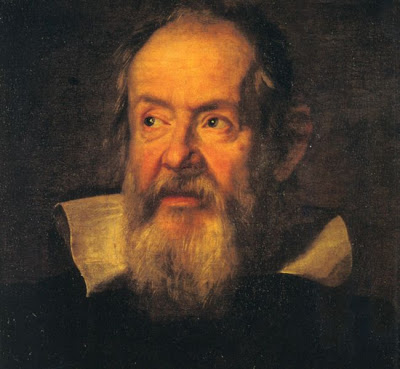Galileo galilei--Biography

Galileo Galilei was born on 15 February 1564 near Pisa, the son of a musician. He began to study medicine at the University of Pisa but changed to philosophy and mathematics. In 1589, he became professor of mathematics at Pisa. In 1592, he moved to become mathematics professor at the University of Padua, a position he held until 1610. During this time he worked on a variety of experiments, including the speed at which different objects fall, mechanics and pendulums.
In 1609, Galileo heard about the invention of the telescope in Holland. Without having seen an example, he constructed a superior version and made many astronomical discoveries. These included mountains and valleys on the surface of the moon, sunspots, the four largest moons of the planet Jupiter and the phases of the planet Venus. His work on astronomy made him famous and he was appointed court mathematician in Florence.
In 1614, Galileo was accused of heresy for his support of the Copernican theory that the sun was at the centre of the solar system. This was revolutionary at a time when most people believed the Earth was in this central position. In 1616, he was forbidden by the church from teaching or advocating these theories.
In 1632, he was again condemned for heresy after his book 'Dialogue Concerning the Two Chief World Systems' was published. This set out the arguments for and against the Copernican theory in the form of a discussion between two men. Galileo was summoned to appear before the Inquisition in Rome. He was convicted and sentenced to life imprisonment, later reduced to permanent house arrest at his villa in Arcetri, south of Florence. He was also forced to publicly withdraw his support for Copernican theory.
Although he was now going blind he continued to write. In 1638, his 'Discourses Concerning Two New Sciences' was published with Galileo's ideas on the laws of motion and the principles of mechanics. Galileo died in Arcetri on 8 January 1642.
from: bbc.co.uk
- Einstein quotes
- Newtons Quotes
- Einstein's Biography
- Newton's Biography
Check this video:
- Historical Of Telescopes
Historical of Telescopes Telescopes made their mark in the history almost 400 years back in early 1600?s. It all began when Galileo, an Italian mathematician, invented a new mechanical instrument that helped him in realizing his dream of viewing different...
- An Introduction To Astronomy And Stargazing
Mankind has always been fascinated with the heavens since time immemorial. Stargazing was not just a pastime on lovely nights. People navigated the seas and crossed continents with stars as their guide. They even thought the constellations charted their...
- 400 Years Of Astronomical Outreach
Today marks a very important anniversary for the International Year of Astronomy 2009. As you may know, the International Year of Astronomy 2009 is being celebrated to promote astronomy on the 400th anniversary of Galileo's first observations of...
- Sir Isaac Newton--biography
Isaac Newton was born on 4 January 1643 in Woolsthorpe, Lincolnshire. His father was a prosperous farmer, who died three months before Newton was born. His mother remarried and Newton was left in the care of his grandparents. In 1661, he went to Cambridge...
- Astronomy Milestones
Astronomy Milestones 583 BC : First Prediction of the eclipse of the sun 130BC : Hipparchus calculates distance and size of moon ...
